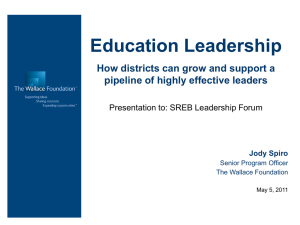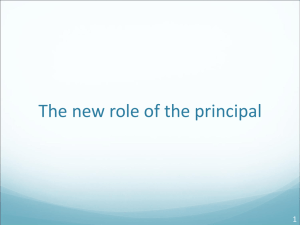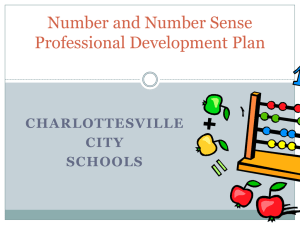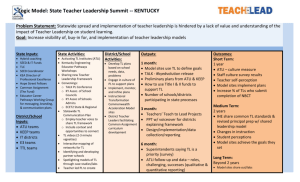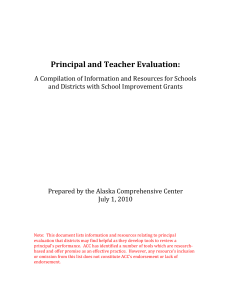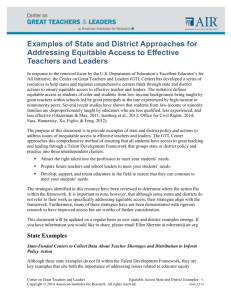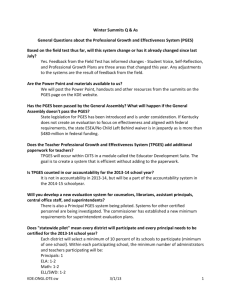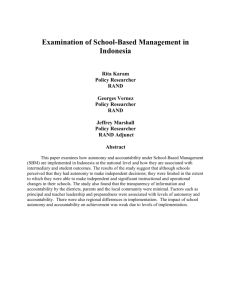HERE - CCSSO State Consortium on Educator Effectiveness
advertisement
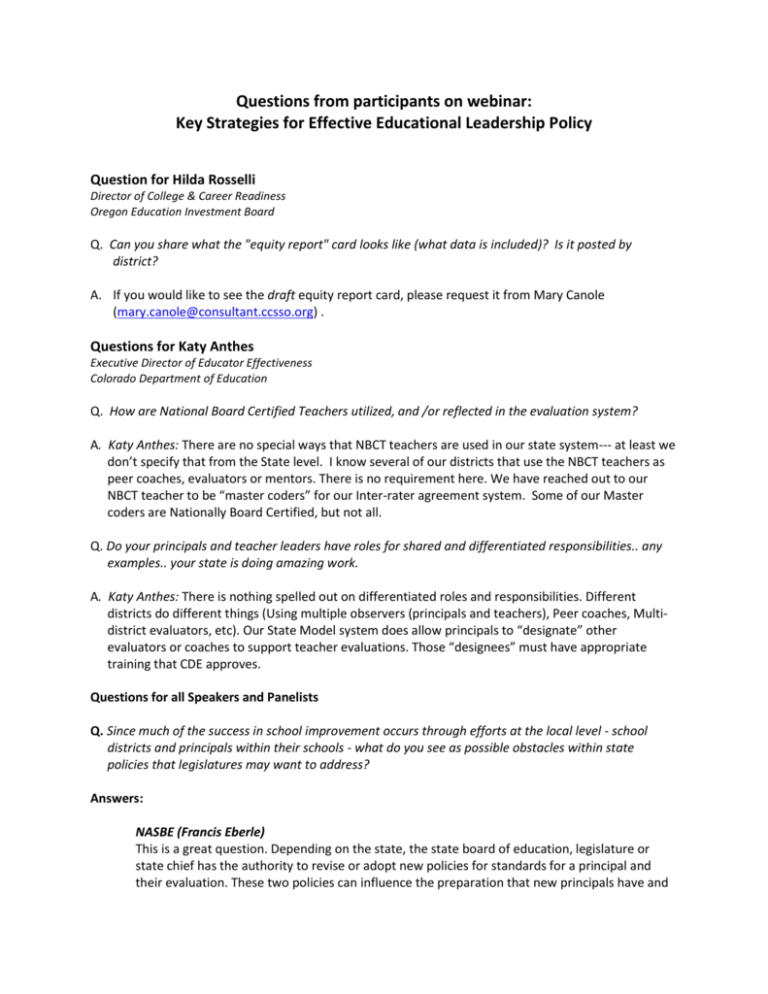
Questions from participants on webinar: Key Strategies for Effective Educational Leadership Policy Question for Hilda Rosselli Director of College & Career Readiness Oregon Education Investment Board Q. Can you share what the "equity report" card looks like (what data is included)? Is it posted by district? A. If you would like to see the draft equity report card, please request it from Mary Canole (mary.canole@consultant.ccsso.org) . Questions for Katy Anthes Executive Director of Educator Effectiveness Colorado Department of Education Q. How are National Board Certified Teachers utilized, and /or reflected in the evaluation system? A. Katy Anthes: There are no special ways that NBCT teachers are used in our state system--- at least we don’t specify that from the State level. I know several of our districts that use the NBCT teachers as peer coaches, evaluators or mentors. There is no requirement here. We have reached out to our NBCT teacher to be “master coders” for our Inter-rater agreement system. Some of our Master coders are Nationally Board Certified, but not all. Q. Do your principals and teacher leaders have roles for shared and differentiated responsibilities.. any examples.. your state is doing amazing work. A. Katy Anthes: There is nothing spelled out on differentiated roles and responsibilities. Different districts do different things (Using multiple observers (principals and teachers), Peer coaches, Multidistrict evaluators, etc). Our State Model system does allow principals to “designate” other evaluators or coaches to support teacher evaluations. Those “designees” must have appropriate training that CDE approves. Questions for all Speakers and Panelists Q. Since much of the success in school improvement occurs through efforts at the local level - school districts and principals within their schools - what do you see as possible obstacles within state policies that legislatures may want to address? Answers: NASBE (Francis Eberle) This is a great question. Depending on the state, the state board of education, legislature or state chief has the authority to revise or adopt new policies for standards for a principal and their evaluation. These two policies can influence the preparation that new principals have and how they are evaluated. Hence, if not reviewed or revised so that they align with your state’s current standards a principal may be held accountable for practices that are not necessarily recognized as effective. This misalignment would be an obstacle for principals. It would be worth checking your state to see who has the authority. Hilda Rosselli Adding mandates without resources CCSSO (Mary Canole) Ideally, the State Chief, district, and school leaders are working with state legislatures in the collaborative development of strong education policy. If this is not the case, legislatures may take action to ensure that the State chief and state superintendent and principal associations weigh in on legislative packages pertaining to education before they are voted on and become law so obstacles can be avoided. Possible obstacles that legislatures may want to address pertain to the reasonableness of implementation timelines and state mandates without the necessary resources that districts and schools need to implement. NGA (Cortney Rowland) We often hear from states and districts we talk and work with that school and district leaders, particularly school principals, need more autonomy and flexibility over their work in order to be successful – autonomy over schedules, budgets, staffing, etc. Q. Principals tell me one of the hardest parts of their job is managing so many priorities and initiatives. How can state policy leaders help relieve the problem of fragmentation, too many initiatives, lack of focus. Answers: NASBE (Francis Eberle): This is a state by state issue. There are a number of current federal policies that allow for flexibility in the use and reporting of federal programs. Some examples include Transferability Authority, Local Flex or Ed-Flex. Each of these programs, as well as the others, have specific requirements and stipulations. It would be worth checking with the department of education to provide a list of what federal flexibility is available, for what programs and whether the district or school qualifies for participation in these programs. Hilda Roselli: This is a hard one...some initiatives cannot be postponed, e.g. CCSS and SBAC implementation, Ed Effectiveness (Federal Waiver) and some we believe are so critical that they have to be ongoing, e.g. equity, closing the achievement gap, 3rd grade literacy, early learning supports, chronic absenteeism, Grade 11-14 transitions. CCSSO (Mary Canole): Educational policy should focus on the overall vision and expectations (results desired) for the state educational system but provide plenty of flexibility to districts and schools (especially principals) to determine how to get there in ways that fit their unique context. NGA (Cortney Rowland): It is possible for states to provide schools and districts with resources and support while at the same time allowing them the autonomy and flexibility to do their jobs. For example, New York’s EngageNY website is a great example of a one-stop shop for school and district leaders to find resources related to ongoing reform efforts, such as new evaluation systems and standards reform. Taking the time to wade through and vet materials, curriculum options, rubrics, etc. is a challenging task for school leaders to fit into their schedules. Having guidance from the state, whether they decide to use it or not, can be very helpful. Q. Are states seeing any interest in the use of Instructional Rounds for Principals? Answers: Hilda Roselli: Used in some areas but not statewide attention to it yet. Being used more for teachers. CCSSO (Mary Canole): Connecticut, Iowa, and Arizona have done some work with Instructional Rounds. Q. What platform or organizations are you using for your video components... storing, documenting, interactions, all data reports? Answers: Hilda Roselli: State is developing an Oregon Educator Network that will launch in early 2015. Some districts are using district specific systems or purchases systems like PD 360 as part of mentoring efforts, educator effectiveness and/or CCSS Professional Learning Team initiatives.

